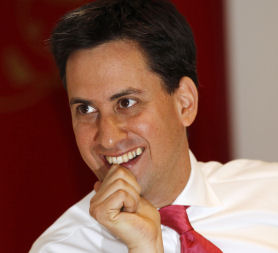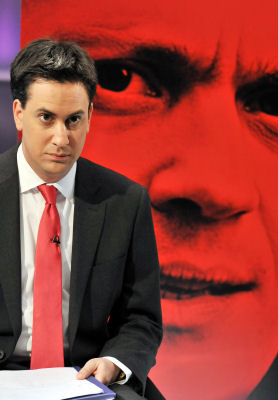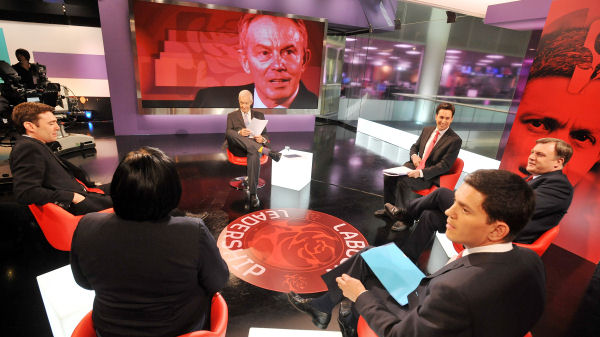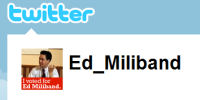Ed Miliband: the alternative brother
 Krishnan Guru-Murthy
Presenter
Krishnan Guru-Murthy
Presenter
Read Krishnan Guru-Murthys interview with Ed Miliband on why he wanted to become Labour’s leader.

Ed Miliband is speaking to me from the last days of his holiday in Cornwall, writes Krishnan Guru-Murthy. Like so many politicians in the new age of austerity he has found the English seaside rather delightful. He is a convert, he says, to British holidays.
One imagines politicians running for the Labour leadership spend their holidays plotting strategy, thinking up policy and devouring news. But Ed Miliband seems to have switched off enough for him not to know what I am talking about when I ask where he stands on the possible strike at Britain’s airports by his supporters in the Unite trade union. It means he can neatly side step the “If they support you, do you support them?” question.
But his answers are largely direct and confident, and he is not being blown off course by criticism being voiced by some that all the candidates are stuck in the delusion that they lost because they didn’t explain themselves well enough, should have been tougher on immigration and easier on civil liberties.
Labour leadership: how a contest works
The deficit and what to do about it does not feature high in the rhetoric, nor as a reason for defeat.
“I think we did great things in government but I think people lost the sense of who we were and what we believe.” Ed Miliband
Ed seems, according to the polls, fundraising and shadow cabinet support, to be a close second to his brother David right now. He has the union bosses, and some high profile supporters.
But the fact the contest is settled by the Alternative Vote means his supporters believe he will be carried to victory by counting people’s second preferences.
The impression, right or wrong, developing about him is that Ed is a bit to the left of his brother David and a little warmer on TV. But critics say he thinks less clearly and will not take on the left of the party in order to win those vital middle class voters in England that Labour has lost.
So, how would Labour differ with him at the helm? “I think we did great things in government but I think people lost the sense of who we were and what we believe. We became managerial and technocratic,” he says.
Vital statistics: Ed Miliband
Age: 40
Constituency: Doncaster North (10,909 majority)
First elected: 2005
Current role: Shadow Secretary of State for Energy and Climate Change
Nominations: 63 MPs, 6 trade unions, 151 constituency Labour parties, 3 socialist societies, 6 MEPs
Donations: £46,450 in July, £15,000 in June (declared to the Electoral Commission)
Who Knows Who: Ed Miliband's map
“That’s why I’ve said that we should be very clear about our values and we should speak up for them. I believe in a more equal society and I think we should say that clearly.
“The gap between rich and poor isn’t just bad for people who are poor; it’s bad for all of us. Our societies which are healthier, happier more secure are those societies that are more equal.”
He goes on to say that it is important for Labour to “recapture the agenda around civil liberties” adding that although mistakes were made he still supports Labour initiatives such as CCTV.
“I’m not someone who believes that everything we did was right on that agenda,” he says.
“I think we need to be the party that shows that we understand that the state can be overbearing and that actually if you’re going to be extending state power you’ve always got to have an overwhelmingly good reason for doing it.”

Economic change
But with “values” being a word of choice for various past Labour leaders, does Ed Miliband’s candidacy really offer anything new? He insists he is offering “profound change” and is ready to tackle the big economic issues.
“I’m proud of our record but I think that you don’t lose elections because you do everything right,” he says. “You do lose elections because you make mistakes.”
“When I think about the economy I think we left too many people struggling on low wages, which is why I feel we’ve got to transform our economy. We can’t just be the people who celebrate the flexible labour market when it means worse terms and conditions for people.
“I think markets are too dominant in our society, we work the longest hours in western Europe, our kids are bombarded by childhood advertising, our town centres and city centres are often taken over against the wishes of local people by the kind of places they don’t want to be there – we’ve go to change that.”
With that in mind, he says that the reason he is standing for Labour leadership is that he believes he is “the most convincing and credible candidate of change”.
“Trade unions are a cornerstone of a civilised society.” Ed Miliband
With the support of the biggest unions he is certainly the candidate with the biggest public backing so far. The candidate says that he aims to stay true to his trade union supporters and will work to improve their lives up and down the country. But, he says, industrial action is not always the key.
“Trade unions are a cornerstone of a civilised society. The fact that we have only 15 per cent of the private sector work force in trade unions I think is bad for many of the workers who are unrepresented.
“I don’t think it should be a point of controversy that trade unions play an important role in giving protection to workers – but I think to caricature the relationship as being somehow a return to secondary picketing, which by the way I’m not in favour of, I think is complete nonsense.”
Ten quick questions:
Where's your favourite holiday destination? Cornwall
What was your favourite subject at school? Maths
What's your favourite drink? Cold bottled beer
What is your biggest fault? I think I'm very demanding - probably too much so of others but also of myself.
Who is your favourite member of the current coalition Cabinet? *Laughs*
If you hadn't been a politician what would you have been? I would love to have been an actor but I fear I don't have the talent.
Who is the advisor you most listen to? My partner Justine
If you could choose any talent you currently don't have what would it be? Play the piano
If Britain adopts AV which part will get your second preference vote? Depends on the candidate
Do you believe in God? No
‘Spending was not irresponsible’
As the coalition prepare for spending cuts to rein in a record budget deficit, Ed Miliband stands by Labour’s legacy. The deficit was “not a major reason we lost the election” he says.
“I don’t think our spending was irresponsible,” he continues.
“What I do believe is that because we didn’t grow in our industries outside financial services, our tax base was too narrow and we were too exposed to the crash in financial services.
“I think there are hundreds of new schools, new hospitals – improvements have been made in communities up and down the country that are a result of the spending that we put in place.”
Would he be opposing all the cuts the Conservatives and Liberal Democrats are proposing now?
“No,” he says, although he warns that the “British people will face the consequences” of the coalition cutting too soon and too deep.
“You already see some warning signals in our economy,” he says, adding that the poorest in society will be affected the most by “cavalier” cuts.
Coalition criticism
Ed Miliband criticises the coalition’s plans saying that their view of public service reform is “basically a recipe for greater inequality”.
He plays down criticism that Labour is not coming up with credible answers for change and development.
“I dispute the idea that we’re not showing how we would make improvements,” he says.
“We said in our manifesto, for example, that we would protect the schools budget, but also we would seek improvements by schools acting federations working together in collaboration – something that I’ve seen in my own constituency, something that could make a difference.
“But this current government has a very different view of public service reform and I think their view of public service reform is basically a recipe for greater inequality… you see it in schools, you see it in relation to some of the things that I think they are planning in the health service which are quite dangerous.”

‘Distinctive’ qualities
So what qualities does Ed Miliband believe he would bring to the job as Labour leader?
“I think I’m most importantly a listener,” he says. “I actually think that listening is a undervalued commodity. I think that listening to the public but also building a strong team around you is very important and it is something that I would make central to the job I do as Labour leader.”
He insists that does not risk being indecisive. Being a listener is a sign of strength he says.
“I think that my toughness and my strength comes from a sense of my values, a sense of my conviction. I think that it is a sign of weakness to say you shouldn’t be listening to others.”
Despite running as a major candidate alongside his brother David, Ed Miliband says that his choice to stand came from a belief that he has something “distinctive” to say.
“I think that my toughness and my strength comes from a sense of my values, a sense of my conviction.” Ed Miliband
“I think that the biggest potential reason for me not standing was the fact that David was likely to be… that was definitely a factor in my mind,” he says.
“For the Labour party itself it was better to have the widest possible choice of candidates,” he adds.
“I think it was better to have everybody who wanted to stand, to stand. As David said to me, it would be quite wrong for me to stand in your way, or me to stand in his way.
“And then when 25 September comes we unite behind the new leader.”

Your questions from Twitter:
Why did you join a cabinet which had so many policies you apparently disagreed with at the time?
I think that the record of the Labour government was a very, very good record but I think you then have to face the fact that when you lose an election you have the opportunity, and indeed the prerequisite, the requirement, that you have to face up to the mistakes that you made.
Overall I think we were a very good government but I think we made mistakes - I'm being honest about those mistakes and I think that's the only way for an opposition to act. I think it's actually the precondition to getting back into power.
Should Labour care about income and equality? What do you think about the spirit level argument that more equal societies do better?
I absolutely think we should, and I've put that at the centre of my campaign. And that's why I'm both for a living wage and for action for a higher pay commission. I think this is why I'm not the candidate for the easy life because I think it is a really hard thing to do to tackle income and inequality in the 21st century, but I think it's absolutely necessary because I think the spirit level argument is bang on. And I think it's completely right that if you want to create a healthy, happy, secure society, then you have to tackle inequality.
You say you should stand up and fight for what you believe in - why doesn't this apply when writing manifestos?
Oh absolutely I did that as a coordinator of the manifesto and I'm proud of many of the things that we put in the manifesto: linking the minimum wage to earnings; a cap on interest rate or doorstep lending; some of the changes we were planning in public services to improve schools; a range of other things that we did.
But I also acknowledge that the scale of renewal that we needed was not something that we managed to do in government and it is something we now need to do in opposition. So I defend the manifesto and think it had lots of good things in it, I accept some criticisms but the most important thing now is in opposition is to move on and bring about the scale of renewal we need.
Isn't there a risk that you appeal to the party and not to the country?
I think there's a sort of mythology. A Labour party member put it to me the other day. He said: "Do you agree with those who say that the job of the leader of the Labour party is to defend the country against the views of Labour party members". And I think that is a profound mistake about where the Labour party is as a political party.
Labour party members are firmly in the centre ground of politics in terms of many of their views. And if we'd listened more to the party on many of the issues that mattered like housing, like agency workers, like tuition fees, we would have been a better government not a worse government. So I think posing this contradiction between the views of members of the Labour party and the view of the members of the public is actually wrong in my view.
Will you and your brother be sitting down to watch the Channel 4 docudrama being made about you?
Definitely not! I try not to read the newspapers or watch docudramas about myself.




